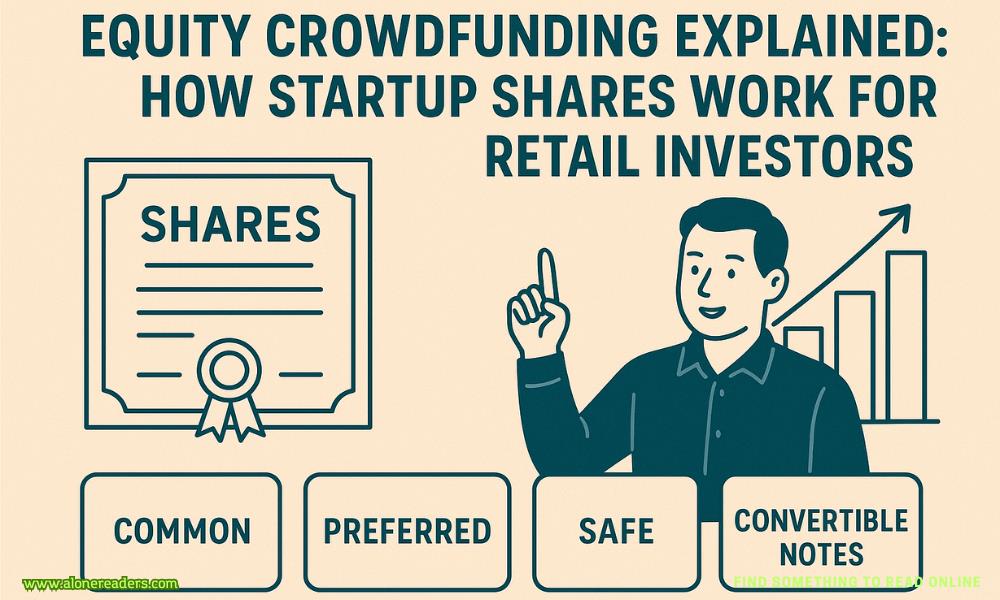
Equity crowdfunding is revolutionizing the way startups raise capital and the public invests in early-stage companies. Unlike traditional crowdfunding where backers receive rewards or products, equity crowdfunding allows retail investors to purchase ownership stakes in companies. But what does this ownership really entail? What types of shares are involved, and how do they affect investor rights, risks, and returns?
This article dives deep into the legal and financial structures that define equity crowdfunding, including an examination of common and preferred stock, SAFE notes, and convertible notes—key mechanisms startups use to structure funding rounds.
Definition and Legal Foundation
Equity crowdfunding refers to the process where startups raise capital by offering securities to the public, primarily through online platforms. In many countries, including the United States, equity crowdfunding is regulated to protect investors. For instance, in the U.S., Regulation Crowdfunding (Reg CF) allows eligible companies to offer and sell securities via crowdfunding platforms registered with the SEC.
How It Differs from Other Fundraising
Unlike angel investment or venture capital, which typically involve large amounts from a few investors, equity crowdfunding democratizes access, allowing individuals to invest relatively small amounts—sometimes as low as $100—in startups. However, this accessibility also introduces complexities, especially in understanding what kind of security or "share" one actually receives.
The Hierarchy of Claims
Startups are built on a capital stack, which ranks who gets paid and when. At the top are secured creditors, followed by unsecured creditors, preferred equity holders, and finally, common equity holders. Equity crowdfunding investors typically fall into the last two categories: preferred or common shareholders—or in many cases, holders of special instruments like SAFEs or convertible notes that might convert into equity later.
Investor Risk Profile
Retail investors via equity crowdfunding usually have the least seniority in the capital stack, meaning they are among the last to receive returns in a liquidity event (like a company sale or IPO). Therefore, understanding the type of investment is crucial before pledging funds.
Common Stock
What It Is
Common stock is the most basic form of equity, representing ownership in a company. Holders of common stock typically have voting rights but are last in line for dividends or liquidation proceeds.
What It Means for Investors
In equity crowdfunding, common shares are often offered to retail investors due to their simplicity and reduced legal complexity. However, these shares may not come with robust rights, especially if institutional investors hold preferred stock with superior privileges.
Preferred Stock
Key Characteristics
Preferred shares provide certain privileges over common stock. These may include dividend preferences, liquidation preferences (e.g., “2x liquidation preference” means receiving twice the invested amount before others), and sometimes anti-dilution protection.
Investor Implications
Although preferred shares are more secure than common stock, they are rarely offered to retail investors via crowdfunding platforms. When they are, it signals a more investor-friendly deal—but read the terms carefully.
What is a SAFE?
A SAFE is not a traditional equity or debt instrument. Instead, it’s an agreement where the investor gives money now for the right to obtain equity later, usually when the startup raises a priced round from institutional investors.
Key Terms to Understand
Why Startups Use SAFEs
They are founder-friendly, simple to administer, and avoid the need to determine a current valuation. For startups, this means less negotiation and legal cost.
Risks to Investors
SAFEs can be beneficial if the company performs well and raises a priced round quickly. However, if the startup never raises another round or fails, the SAFE becomes worthless.
How They Work
Convertible notes are debt instruments that convert into equity in the future. Unlike SAFEs, they accrue interest and have a maturity date, after which they must convert or be repaid (though repayment is rare in early-stage startups).
Core Terms to Review
Benefits for Investors
Convertible notes offer more legal structure than SAFEs and may provide a small amount of downside protection due to the debt feature. However, like SAFEs, they often require a future equity round to convert.
Lack of Liquidity
Shares or instruments bought through equity crowdfunding are illiquid. There's usually no secondary market, meaning you cannot sell your stake unless the company is acquired, goes public, or arranges a buyback.
Exit Outcomes
Dilution Considerations
Future rounds of funding may dilute your ownership unless you hold anti-dilution protections (rare for retail investors). Always read whether your shares will be diluted and if you have pro-rata rights to maintain your stake.
Voting Rights
Common shareholders may have some voting power, such as electing board members. However, in many crowdfunding deals, shares are issued with limited or no voting rights to simplify management.
Information Rights
Companies may or may not be obligated to provide regular updates or financials. Platforms like Wefunder or StartEngine encourage updates, but legal enforcement can be weak unless explicitly written into the offering terms.
Drag-Along and Tag-Along Clauses
Retail investors must understand how these clauses could affect their ability to benefit (or suffer) during liquidity events.
Due Diligence Tips
Red Flags
Final Thoughts: Is Equity Crowdfunding Worth It?
Equity crowdfunding offers retail investors a chance to participate in high-growth potential startups that were once only available to VCs and angels. But it comes with serious risks: lack of liquidity, complex instruments like SAFEs and convertible notes, and a high rate of failure among early-stage companies.
Investors must go beyond the pitch video. Carefully read offering documents, understand the security type, and know where you stand in the capital stack. If approached wisely and as part of a diversified portfolio, equity crowdfunding can offer exciting—but speculative—investment opportunities.